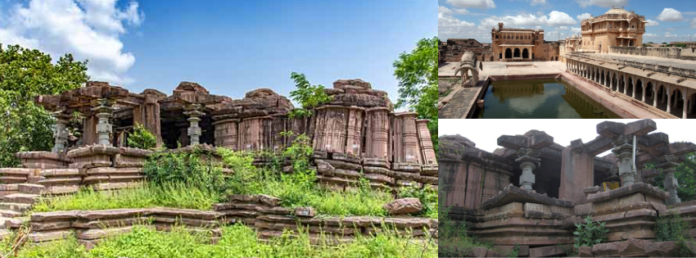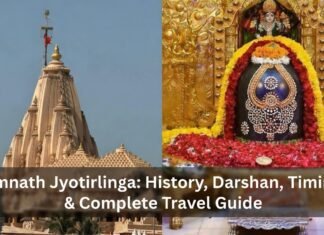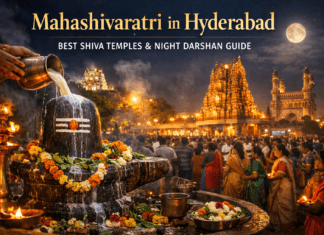Introduction:
Nestled approximately 8 km north-east of Karimnagar city, Nagunur village in Telangana is a treasure trove of historical and religious significance. This ancient site is renowned for its rich heritage and the remnants of its majestic past, encapsulated in the ruins of its fort and temples. With a history dating back to the Kakatiya dynasty, Nagunur serves as a testament to the region’s political and religious importance during medieval times.
“Also, know about the history of the Kakatiya dynasty and explore historical sites associated with the Kakatiyas.”
Nagunur Temples: Architectural Marvels
Nagunur is home to several prominent temples, each bearing witness to the region’s architectural and cultural evolution. Key among them are:
- Vaishnava Temple: This temple reflects the Vaishnavism tradition, dedicated to Lord Vishnu.
- Shiva Temple: The most significant of the lot, featuring intricate carvings and three distinct shrines dedicated to Lord Shiva.
- Main Trikuta Temple: Known for its triple-shrine layout, this temple showcases the grandeur of the Kakatiya architectural style.
- Ramalingala Gudi Temple: Another notable temple, revered for its historical and religious significance.
The Shiva Temple stands out as the largest and most important structure within the complex. It is constructed from red stone and features three shrines dedicated to Lord Shiva, arranged on a raised pedestal. This temple is not only a religious focal point but also an architectural marvel, with its ornate carvings and sculptures.
Also read: Vemulawada Raja Rajeshwara Temple: An Exclusive Journey Through History
Historical Significance of Nagunur Fort
Nagunur Fort, built by the Kakatiya dynasty, is a critical part of the site’s historical narrative. The fort’s strategic location and its role as a political and religious center underscore its importance. During the Kakatiya period, it was a prominent fortress, reflecting the imperial prowess of the dynasty. The fort houses ruins from both the Western Chalukya and Kakatiya periods, highlighting its historical depth.
The fort’s name, Nagunur, is derived from the numerous temples that once dotted the landscape legend has it that there were about 400 temples here, earning it the local name Naluguvonalu. Over centuries, the name evolved into Nagunur, as it stands today.
Also read: The Ultimate Guide to the Top 10 Temples Near Warangal
Architectural Highlights
The Shiva Temple within the fort complex is particularly noteworthy. It features a striking architectural design with detailed carvings of dancers in graceful poses and musicians playing traditional instruments like the Mridangam. The temple’s northern entrance leads to a hall and a porch that add to its grandeur.
In addition to the Shiva Temple, the fort area includes several other temples, now in various states of disrepair. These ruins, scattered along the Telangana State highway from Karimnagar to Rayapatnam, offer a glimpse into the once-vibrant religious life of the region.
Visiting Information of Nagunur Fort
- Location: Nagunur Village, Karimnagar District, Telangana
- Distance from Karimnagar: Approximately 10 km from Karimnagar Bus Station and 1.7 km from Nagunur Bus Stop.
- Distance from Hyderabad: Around 177 km
- Fort Timings: 8:00 AM to 6:30 PM
To reach Nagunur, visitors can take the road from Karimnagar towards Choppadandi, which is well-connected by local transportation. The site is accessible and offers a unique opportunity to explore the ancient heritage of Telangana.
“We’d love to hear from you! Whether you have a question, feedback, or a travel story to share, feel free to get in touch with us. Here’s how you can contact us:”
Conclusion:
Nagunur Fort and its associated temples provide a captivating insight into the historical and architectural richness of the Kakatiya dynasty. The ruins and temples are not just relics of the past but also stand as silent witnesses to a bygone era of grandeur and devotion. Whether you’re a history enthusiast or a cultural explorer, Nagunur is a destination that promises both enlightenment and inspiration.
Frequently Asked Questions(FAQs)
Answer: Nagunur Fort and Temples reflect the political and religious importance of the Kakatiya dynasty during medieval times.
Answer: The main attractions are the Shiva Temple, Vaishnava Temple, Main Trikuta Temple, and Ramalingala Gudi Temple.
Answer: Nagunur is located about 10 km from Karimnagar Bus Station and is accessible via the road from Karimnagar towards Choppadandi.
Answer: The temples feature intricate carvings, triple-shrine layouts, and sculptures of dancers and musicians.
Answer: The visiting hours are from 8:00 AM to 6:30 PM daily.











